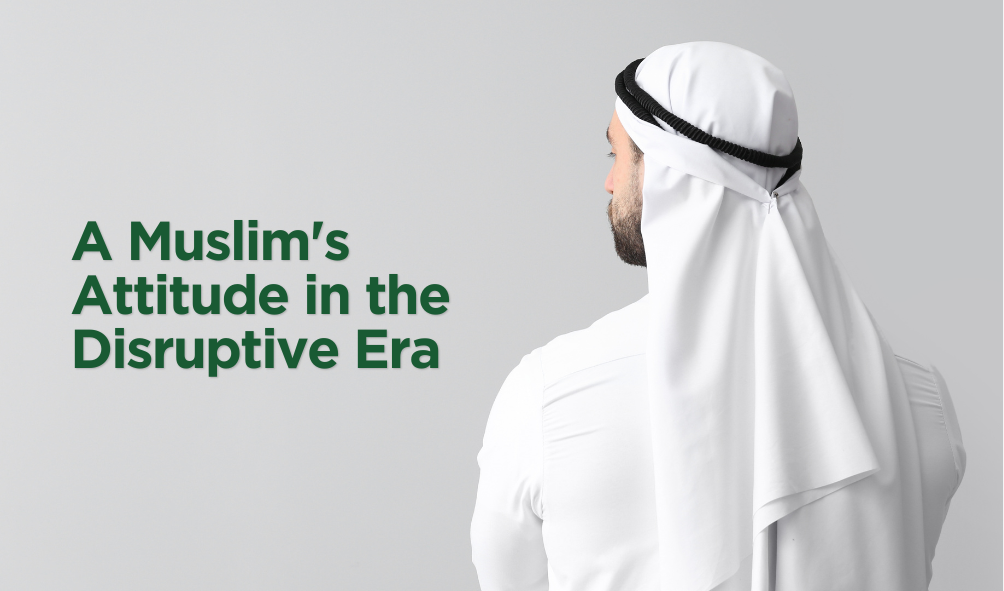A Muslim’s Attitude in the Disruptive Era
Rapid changes in every area including education society the economy and technology characterize the disruptive era. These shifts require a Muslim to maintain a strong commitment to Islamic values while adopting a flexible productive mindset.
Increasing Piety and Faith
A Muslim must first be spiritually intelligent. Muslims need to strengthen their faith and piety in the face of digital temptations and the deluge of information. The Quran emphasizes this:
“And hold firmly to the rope of Allah all together and do not become divided…” (QS. Ali Imran: 103)
Increasing faith serves as a buffer against the detrimental values brought about by fast change in this disruptive age. The secret to being a productive is to prioritize actions set clear intentions and practice good time management. Developing a deeper comprehension of the Quran and Sunnah is another way to strengthen one’s faith. Muslims should attend Islamic studies to increase their religious knowledge and make dhikr a habit. Resilience in the face of lifes challenges is fostered by strong faith. It is also important for Muslims to establish faith-based social networks like joining mosque-based social programs, Islamic study groups or da’wah communities. In the face of swift change this is essential to preserving the quality of faith. being proactive and shrewd when dealing with change.
Also read:Define Moral in Islam: Not Just Ethics
Being Proactive and Wise in Facing Changes
Disruption modifies our interactions, learning and working methods. Muslim youth need to take advantage of opportunities rather than just complaining about difficulties. While maintaining his monotheistic beliefs Prophet Muhammad (peace be upon him) was a living example of flexibility. Muslims in this day and age must learn to use technology effectively and avoid its drawbacks.
Islamic educations transformation which means pesantrens (Islamic boarding schools) and madrasahs need to change without losing their identity is also important. Muslims must also be flexible in their adaptations while upholding the principles of justice, honesty and monotheism. Islamic educational establishments need to maximize governance, educational facilities and human resources in order to manage change. To adapt is to use innovation to spread dakwah and goodness not to give up values. For wider outreach social media online learning environments and other digital apps should be innovative tools. It is imperative that Muslims transform from objects to change agents. This includes creating tech companies with a halal focus starting online social movements and developing cutting-edge sharia-based education.
It is impossible to overestimate the significance of critical and intelligent thinking. Muslims need to be digitally literate and selective in the face of the deluge of information. Trends are not always consistent with Islamic principles. It is the responsibility of Muslims to filter evaluate and react in accordance with true Islamic principles.
Also read:Optimism Pessimism in Islam
Upholding Morals and Fostering Brotherhood
Dedication to moral character needs to be upheld. Islamic behavior in the disruptive age places a strong emphasis on digital etiquette including being courteous speaking politely on social media and showing respect for others. It is essential to revive the spirit of cooperation and create constructive communities is Islamic society. Individualism is often encouraged by the disruptive era. Muslims must combat this by promoting ukhuwah Islamiyah or Islamic brotherhood. Muslims should be involved in the social economic and educational spheres when establishing communities. The spirit of ukhuwah in the disruptive age is embodied in the establishment of fruitful partnerships such as halal business networks, online Islamic forums and community empowerment initiatives.
Also read:Patience and Gratitude: Two Intertwined Principles
Conclusion
In conclusion, the three fundamental components of a Muslims mindset in the disruptive age are unwavering faith, moral integrity and flexibility. Muslims will not only weather the changes with these advantages but they will also lead the way in societal innovation and moral leadership. Hopefully we can be amongst adaptive muslims in this disruptive era without losing our core value which is Iman.

Let’s Visit, Zeed and join for halal investment with Zeed.
References
Bahri, S., Masyitoh, & Herwina. (2023). The Challenges of the Era of Disruption and Its Impact on Islamic Educational Institutions. Proceeding: Reinventing Islamic Education and Development Technology for Future, 1, 1-18.
Majelis Tabligh Pimpinan Pusat Muhammadiyah. (2022). Friday Sermon: Muslim Youth in the Disruptive Era, Challenges and Opportunities. Retrieved from https://majelistabligh.id/khotbah-jumat-pemuda-islam-di-era-disrupsi-tantangan-dan-peluang/
Muslim.or.id. (2021). Becoming a Productive Muslim in the Disruptive Era. Retrieved from https://muslim.or.id/91100-menjadi-muslim-produktif-di-era-disruptif.html
Puspitasari, D., Yuliani, B., & Huda, M. K. (2020). The Transformation of Islamic Education in a Disruptive Era: Is It A Necessity?. ICIS 2020, Proceedings, Ponorogo, Indonesia.
Suara Muhammadiyah. (2022). Islamic Behavior in the Disruptive Era from a Psychological Perspective. Retrieved from https://web.suaramuhammadiyah.id/2022/04/06/perilaku-islami-di-era-disrupsi-dalam-pandangan-psikologis/







